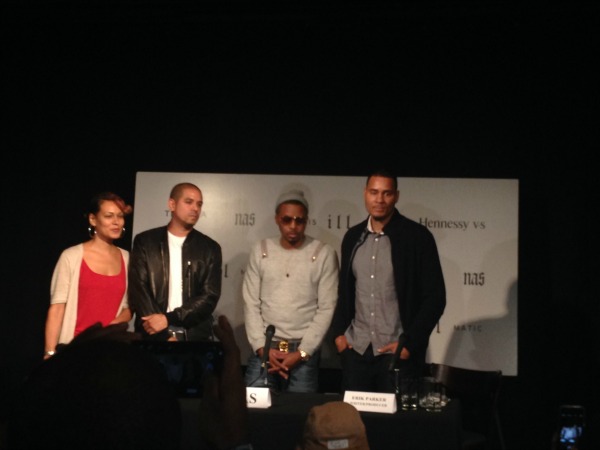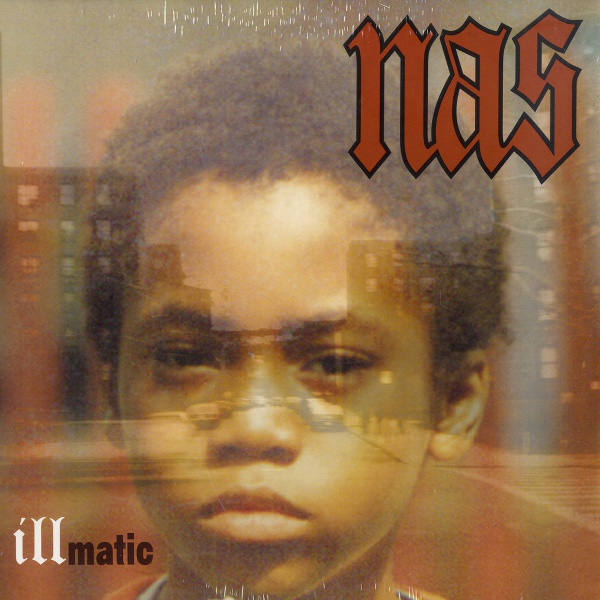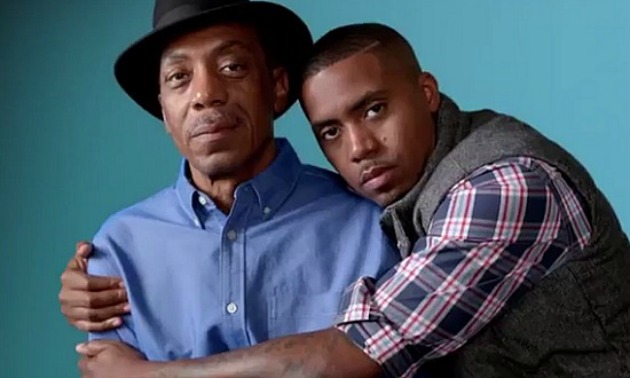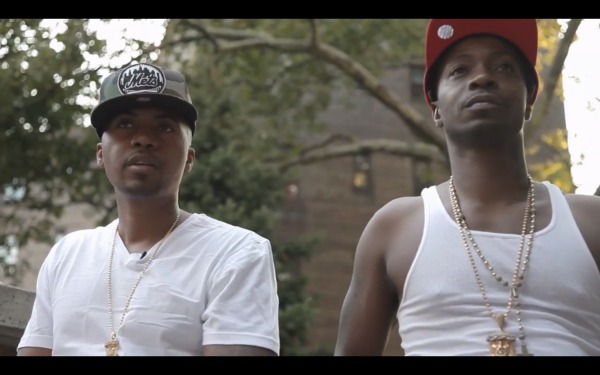
It’s hard to argue with the notion that “Illmatic,” the 1994 debut album from Queensbridge hero MC Nasir “Nas” Jones, is one of the most iconic albums in hip-hop history – maybe even of the 1990s in general. Nas’ unique lyric patterns and hard-nosed production from the likes of Pete Rock, Dj Premier, Large Professor, and others established east coast hip-hop as a force to be reckoned with. Twenty years later, its impact and meaning haven’t dulled, and now it has documentary proof of its importance.
“Time is Illmatic,” directed by multimedia artist One9 (pictured left) and written by Erik Parker (pictured right), takes viewers on a journey through the world that birthed the Nas the world was introduced to when “Illmatic” dropped 20 years ago. I got the chance to talk with both men about the making of the film, their favorite Nas songs, and where they think hip-hop is heading from here. Hit the jump for the interview.
Follow @Rastaman0318 Follow @TheUrbanDaily
1: Where did the idea to make “Time is Illmatic” come from?
Erik: “Ten years ago, I was the music editor at Vibe Magazine and was working on the tenth anniversary of the making of “Illmatic”. It was a print piece and it [the story of Illmatic] had never been told from any other perspective other than print. It was such a landmark piece that explained so much and touched so many people that there had to be different ways to tell that story. So me, One9, and three other guys got together and said ‘Let’s shoot and go out of pocket and do whatever we can to try and tell this story in a different format and tell the story in the way that we saw great stories told on TV or maybe even film.’
One9: Erik and I grew up off of hip-hop and early hip-hop albums and we knew this was a seminal and groundbreaking album and we knew that times would change after this album was made, so when we had the opportunity to do something like this, we went completely out of pocket. No money – we were just calling in friends and favors. We started shooting Nas’ father Olu Dara, Pete Rock, pretty much anyone who was involved in the film without Nas, and after that we cut a trailer and sent it to his manager to see what he wanted to do. We were people who wanted to make a film and had never made a movie before, so why not “Illmatic”?

2: What was the experience of working with Nas and his family like?
Erik: His father wasn’t difficult to get in touch with at all. I already had a lot of contact with him and he was really open to talking about Illmatic… He has a really outgoing personality and a big part of the film because it was his interview that opened us up to a different type of story. Originally, we were talking solely about the making of the album, what happens inside the booth, when somebody decides to say this instead of that, or push this button instead of that button, but we talked to Olu Dara as a jazz and blues musician in his own right, and opened the door to the legacy to the Jones family and to what really led to the creation of Illmatic. It wound up becoming a much bigger story as a result.

3: Who was the hardest interview to secure?
One9: Over the years prior to us finishing, we had the hardest time getting a hold of Nas’ brother, Jabari “Jungle” Jones. That was the hardest thing we had to do for the film because we never knew when he was going to call us back, and if we did get a call back, whether or not he was going to show up. That happened for a couple months, off and on. He’s a really good guy, but he’s hard to lock down. It wasn’t until Nas himself came by our studio to look at the old and new footage, stuff that resonated with his life, that he started to open up and said ‘I’m connecting to what you guys are doing. You’re coming at this from an insider’s perspective, not on the outside looking in.’ After two hours went by, he called Jungle and told him ‘You’ve gotta come and look at this.’ So here comes the infamous Jabari “Jungle” Jones coming up the elevator, you know, he’s moving sideways, and he sees the footage of his father that we have that was filmed of his father by a student at NYU…we sat there for four or five hours looking at and listening to footage and Jungle came to realize that we were coming from a perspective where his brother was comfortable and he was comfortable and we’re telling a piece of their story and their culture from an understanding mindset, so at that point getting Jungle wasn’t hard. We ultimately realized that Jungle’s interviews are some of the best in the film.

4: Was the decision to focus mainly on the years leading up to Illmatic deliberate?
Erik: It was absolutely deliberate. We originally started this project to talk about Illmatic and explore and unpack some of the issues that surrounded the making of the man who made the album. We didn’t want to muddy up that story by telling the story of all the albums that Nas made, but it was also important for us to show that Harvard scene where the hip-hop fellowship is being named in his honor because it was a direct result of Illmatic. The kid who made Illmatic had come all this way, so we do fast-forward, but it wasn’t our intention to tell the story of Nas as it were. It was our intention to tell the story of Illmatic, which included all the people that he spoke for on the album.
One9: One of the processes we went through was figuring out how to tell the story with all the imagery, so we decided to look at the artwork and tracklist on the back of the album cover and relate that to the bigger issues. On “NY State Of Mind,” we wanted to look at the history of police brutality in New York City from a macro perspective, from a socio-economic perspective, and how it affected the Jones family and ultimately how it affected Nas. “Life’s A Bitch” looks at families being torn apart, so we looked at how that affected the community, how that affected the Jones, and Nas as a seven-year-old becoming the man of the home. “One Love” focuses on the prison system in NYC at the time with Reganomics and the drug wars playing such a big role. We looked at issues and narrowed them down to a microcosmic level of how they affected the Jones family, and that’s how we decided to choose these as a narrative and flesh them out. We knew that Illmatic would be the end all be all, but it had to go back to a deeper history and understanding of where the album came from.
5: What’s your favorite Nas song from across his discography?
Erik: I have a couple great Nas songs, but let me stick with “Illmatic” (laughs). I think “One Love” makes “Illmatic” because the story is so profound and still stands today. What Nas wanted to do with the music and what we wanted to do with the film was not beat people over the head with the themes we’re trying to express, and Nas does it on “One Love.” He writes a letter to his friend who’s locked up in jail and doesn’t say “Look how horrible it is for us,” it’s a song about love for his friend who made the wrong decision to go this way, instead of that way. And he doesn’t do it in a heavy handed way. He does it in a simple letter that’s so profound and makes you do the work and open your mind and wonder “What happened to this kid? What relationship did they have?”
One9: I agree. I think “One Love” opened up that dialogue that Erik just mentioned, but the first time I heard that honesty and vulnerability from a rapper, talking about it from a very sincere point of view. He’s not shooting any body up, he’s not over exaggerating, he’s just writing an open communication to his friend. My favorite part of the song is when he’s talking to the 12-year-old on the bench and he’s giving him insights. Not preaching to him, but giving him hope and saying “I’ll drop some jewels in your head, you can sell if you choose,” and metaphorically it’s done in such a way that you can visualize everything he’s saying. Like, he’s smoking weed with the kid! (laughs)
Erik: He’s not preaching! He’s saying this is where we are.
One9: He gives you slices of life, and in that particular song it’s so raw and gritty, but also so poetic. To me, that’s my favorite, and there’s so much of that in Illmatic…In “NY State of Mind,” he says that “I’m walking you through hell and back.”
CineMasai: I’d have to say it’s always been a toss-up between “One Love” and “The World Is Yours,” because that and “NY State of Mind” were the first two songs I heard off the album and they helped me to understand where I could possibly be in the world and gave me insight into hope and optimism that I’d never heard in any song before, so that hit me hard when I first heard it.
6: Do you think there’s an album that’s come out in the last 20 years that has had the same impact as Illmatic?
Erik: It’s difficult to say what’s had the impact. We’ll know 20 years from now. “Illmatic” came out 20 years ago and one way to judge its impact is its cultural context. The cultural context of “Illmatic” is even greater now than it was back then. As a society, we can continue to unpack it deconstruct it to this day. I’d say it remains to be seen. Maybe there are albums out now that will have the same impact that are being made right now or have been made. But we’ll know in 20 years for sure.
One9: There’s a big difference in the way we experience music between the 90s and now. In the 90s, there wasn’t an option to go access and download an album off the Internet. If you played it, you played it in a walkman or on a turntable or in a car. Music tended to be a shared experience. Now, people share music differently and it’s more accessible than ever, so I agree with the notion that we’ll know 20 years from now. Trying to gauge it now, I don’t want to say it’s right or wrong, but people share music so differently now, and to embody all that honesty and rawness in one package on “Illmatic,” I’m sure it will resonate with a new generation. It’s incomparable.

8: What do you want the takeaway message of “Time is Illmatic” to be?
Erik: I think the most significant thing we want people to take away from this movie is that Nas is a great poet and he’s celebrated as a poet. but what we really want people to understand is that Nas wouldn’t be Nas if it weren’t for the people he spoke about and spoke for on Illmatic, and it’s as much about the people whose stories he tells as it is about Nas himself. It’s very easy to be seduced by the brilliance of Nas’ poetry and to stop there without going further into “Who is he talking about?” We know what he’s talking about, but who he’s talking about. Once you give these people a face and a voice, you can’t turn your back on what he’s saying. It’s easier to celebrate Nas as a great poet and “Illmatic” as a great piece of artwork in American history, but to not understand the stories of these people and where they come from, it would be a lost opportunity…the film tries to get people to look at Nas past the poetry…I want people who wouldn’t normally understand to see it. I want Congressman Boehner to see it.
One9: I hope that this film will be a platform to educate. It’s time that we starting documenting our culture in a way that we understand and that we express those nuances in a way so people will get it. We want to open up that dialogue for a new generation to look at not just “Illmatic,” but “Time is Illmatic” as inspiration to create their own music or film that inspires new generations like “Illmatic” did for us.
“Nas: Time is Illmatic” will be released in New York and Los Angeles on October 1 and be released on iTunes, Video On Demand, and in select theaters nationwide on October 3.
Dylan “CineMasai” Green is a movie geek, hip-hop aficionado, and pita chip enthusiast. Find him on Twitter.
Like TheUrbanDaily.com on Facebook!
One9 and Erik Parker Talk Impact, History, and Hip-Hop With “Time is Illmatic” was originally published on theurbandaily.com

















